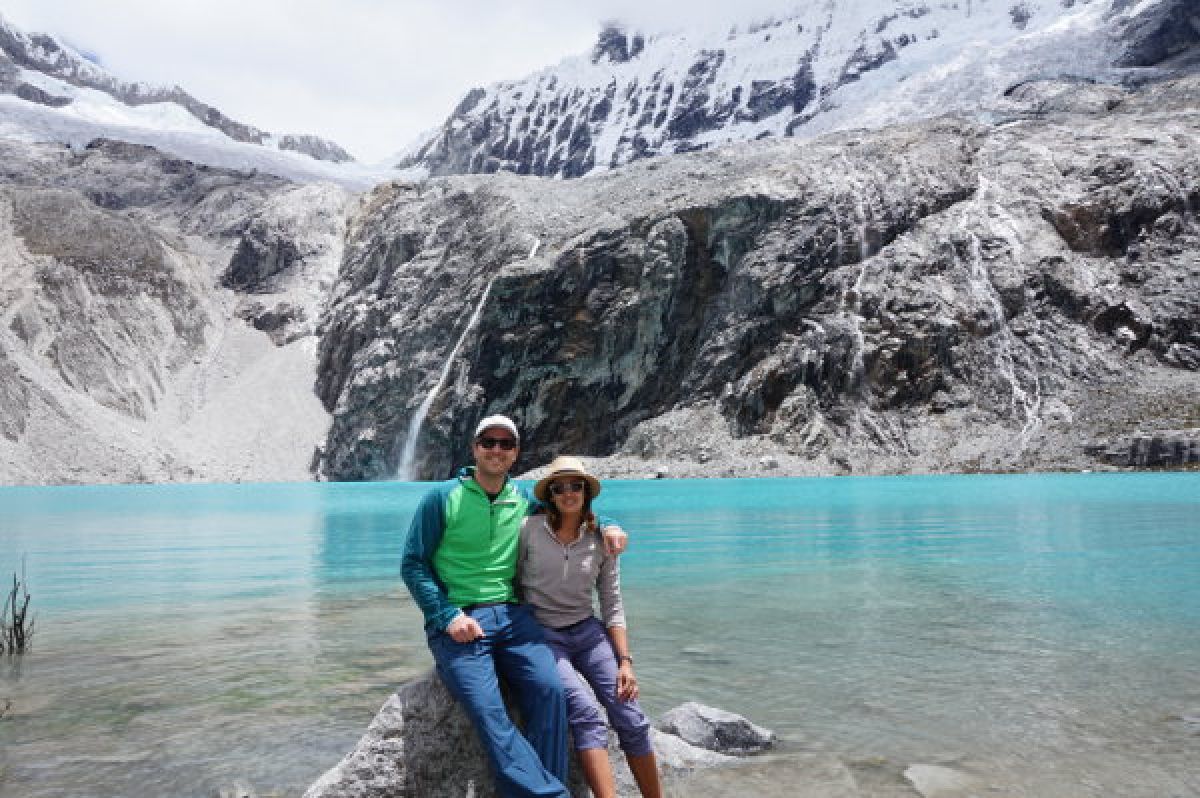
Where are you from, Danielle, and what are you doing nowadays?
I'm Danielle, originally from the island of Grenada in the Caribbean. I then moved to the UK for university and ended up living there for 12 years. I moved to Lima, Peru with my fiance Steven in October 2015. Before moving here, I was Content Manager for the British Council, marketing teaching resources and cultural exchanges for schools and teachers around the world.
Now, in Lima I still work in digital content, for a luxury travel company. I'm also a freelance copywriter and travel writer and have my own blog where I document my adventures - Pelicantales.com.
Why did you choose to expatriate to Peru?
It's probably more accurate to say Peru chose me. I always dreamed of coming to South America - it's been at the top of my travel hit-list for ages. Steven and I were trying to figure out how we could make it happen - we thought about saving up and taking sabbaticals from our jobs to go traveling. That was looking unlikely, and then out of the blue he was offered a transfer with his company, so we jumped at the opportunity!
As a Caribbean national, what were the procedures you had to follow to move there?

For nationals of most countries, it's quite easy to come to Peru on a tourist visa, which allows you to stay in the country for up to six months (without working). To be resident in Peru and work here it's a bit more tricky. To get your carnet de extranjeria (work permit), you need to have a job offer from a company willing to do the paperwork and process the application for you.
How long have you been in the country?
Nearly eight months which have really flown by. I still feel very new - still settling in and getting to know the place.
What has attracted you to Lima?
Lima is a fantastic cultural and culinary hub. Having lived in London, it's nice to still be in a big city with so much on offer. On the other hand, it's great to be somewhere so very different with a completely new culture, language and food to experience and learn about. Lima is also great as a base for exploring the rest of South America, which is my plan while living here.
What has surprised you the most at your arrival?
How cold it was! We arrived at the end of October, and it was an El Niño year, so the winter really hung around before finally fading away and giving us a glorious southern hemisphere summer. I think I was also surprised by how familiar it felt thanks to globalization and capitalism! With Starbucks, TGI Fridays and H&M, you're bought to find something from "home" wherever that may be.

Was it difficult to find accommodation there? What are the types of accommodation which are available there?
Lima has had an economic boom over the last few years, and consequently every other day there seems to be another apartment block going up - especially in Miraflores, the upscale coastal neighborhood that's popular with expats. There were loads of nice apartments available in the areas we were interested in. But what was difficult was having to commit to a neighborhood when we were so new to the city and unsure about where we wanted to live!
What are the local labor market's features? Is it easy for an expat to be hired there?
Peru has been doing well economically, so there are jobs around. For expats with native English and/or other languages, and international experience these can improve your employability. Mining is big business, so many expats find jobs in that industry or teaching English. Otherwise, on the open market, speaking good Spanish is a must. I was lucky to find a marketing job where most of the work is in English, but I still have to speak in Spanish with my colleagues which is good for practicing and improving.
How do you find the local lifestyle?
I love the lifestyle here. People are outgoing and and sociable, but with less of a drinking culture than London (my liver is glad). In the evenings and weekends, there are always people outside - walking in the parks with their families and pets, exercising, socializing. On Sundays in Parque Kennedy in Miraflores, there's a small amphitheater where people come to dance, including lots of older couples. It's really beautiful to watch, and to me it really illustrates the lifestyle here - being outside, enjoying music, enjoying dancing, enjoying life.

Have you been able to adapt yourself to the country and to its society?
I think this is still a work in progress. I've made friends with mostly expats, and would like to meet more locals to understand Peruvian culture and society more. Peru has just had national elections, so to be here during that, to talk to people about the different candidates, to see the political rallies and protests has been an eye-opening experience to learn more about Peruvian society.
What does your every day life look like in Lima?
My office is 10 minutes' walk from home, so it's great to slowly walk to work, with a quick coffee pit stop en route, instead of the long commute I had in London. Office hours tend to be quite long and I work from 8am to 6pm. Other than that, the routine of daily life is similar, with work, exercising, socializing. Weekends and holidays are spectacularly different.
Any particular experience in the country you would like to share with us?
So many to choose from! Waking up in a tent at 4,000m above sea level, in the middle of the Cordillera Blanca Mountain range, looking out at the morning mist on a lake, and the moon still in the sky. We drove from Lima and went hiking with friends to Laguna 69 (check out my blog about the trip). It was surreal and one of the most beautiful sights I've woken up to. Moments like that make me laugh at how I agonized over whether moving to Lima was the right choice.

What is your opinion on the cost of living in Lima and in Peru? Is it easy for an expat to live there?
This always depends on where you're coming from. For me, moving from London, the cost of living is significantly less, particularly for rent, transport and food. Imported items like European cheese and your favorite brand of shampoo from back home are understandably very expensive, but if you're happy to eat what's produced locally you'll find it very cheap. Salaries tend to be a lot less as well, so you need to weigh it all up.
How do you spend your leisure time?
We're probably only going to be in Lima for two years, so we're making the most of our South American base, and traveling as much as we can. Every few months, we head off somewhere new and so far we've been to Argentina, Uruguay and Bolivia. Skiing in Chile and checking out Santiago is up next in a month!
When we're in Lima, we've been eating our way through the culinary delights of Lima - the gastronomic capital of Latin America, and then I furiously try to work it off in the gym, or running along the Malecon - a beautiful cliff-top park that overlooks the Pacific Ocean and stretches for miles along the coast.
What do you like the most about the country?
The diversity of the terrain and geography. Peru is coast, desert, highlands and jungle. We've only scratched the surface, but from one location to the other, you feel like you're in a completely different country. There are so many parts of this country I want to explore - the Amazon is the top of my list.
Your favorite local dishes?

I'm a real foodie, but I have coeliac disease, which means I have to follow a strict gluten-free diet. At times, this has been really tricky. It's taken a lot of adjustment, after living in London where awareness of gluten and availability of gluten-free food is so high. But I've embraced it, and really enjoyed exploring Peruvian food in restaurants, the markets and in my own kitchen using new ingredients and recipes. There's so much here that's naturally gluten-free like the amazing seafood and Peruvian staples like potatoes and quinoa.
Everyone's heard of Peruvian ceviche, and it really is delicious. The key is fresh fish - no Peruvian eats ceviche at night! I recently had ceviche in the middle of Lima's Mercado Central in the fish market section. It was such a great sensory experience (read about it in my blog). Another favorite and lesser known Peruvian classic is causa - a dish made with mashed potatoes, but delicately layered with chicken or fish, avocado and flavored with hints of lime and cilantro (coriander).
What do you miss the most about your home country?
I've been living away from home for over 12 years now, so moving to Lima didn't change much about that. I do miss my family and living near the beach (a proper Caribbean beach that is!), and just wish it was quicker / easier / cheaper to get there from South America. From London, I miss my favorite gluten-free Chinese restaurant!
Would you like to give any advice to soon-to-be expatriates in Peru?
Everything is very bureaucratic in Peru, and requires lots of paperwork to get anything done - bring a good dose of patience. For work contracts and visas, you'll need degree certificates, and your passport apostilled in your home country. If you know you're coming to Peru to look for a job, it makes sense to get this done before you leave, which will save you time and money.
What are your plans for the future?
Not sure yet! I still feel like I'm settling into Lima, so the next move will depend how that goes. Medium-term plans are to see as much of this continent as possible and become fluent in Spanish so I can read my favorite book, "A Hundred Years of Solitude" by Columbian author Gabriel García Márquez, in its original language.



















